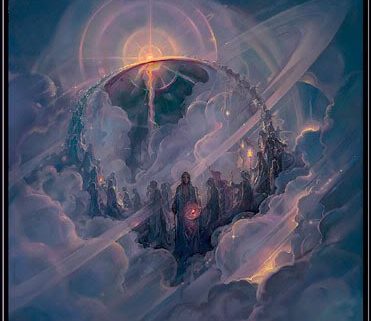If you’re reading this, you’ve probably read enough of the Bible to know that the serpent in Eden was the first character in the Bible to reject the authority of God. It may surprise you to learn that there was another rebel subdued by God, and this took place earlier—even before He said, “Let there be light.”
Right at the very beginning of the Bible, we read:
In the beginning, God created the heavens and the earth. The earth was without form and void, and darkness was over the face of the deep. And the Spirit of God was hovering over the face of the waters. (Genesis 1:1-2, ESV)
The Hebrew word translated “the deep” is tehom, which is a cognate (same word, different language) for the Akkadian têmtum. That, in turn, is a cognate for Sumerian ti’amat, or Tiamat, the primordial chaos-dragon. This link connects the Mesopotamian tale of a warrior-god defeating chaos, recorded in the Babylonian creation epic Enuma Elish, to the Canaanite version of the story. In the Baal Cycle, the storm-god becomes king of the pantheon by defeating the god of the sea, Yam, in single combat. A text found at the ancient city of Mari reveals that the clubs with which Baal allegedly “fought the Sea [Têmtum]” had been transferred from the storm-god’s city, Aleppo, to the temple of the creator-god Dagan at Terqa.
One of Yam’s minions who fell at the hands of Baal was the sea-dragon Lotan (alternatively Litan or Litanu), described in the Baal Cycle as the “wriggling serpent,” the “writhing serpent,” and the “Encircler-with-seven-heads.” That description echoes the Bible’s depiction of the sea-dragon: “Leviathan the fleeing serpent, Leviathan the twisting serpent,” which is not a coincidence.
Secular scholars take this as evidence that the Hebrews plagiarized their religion from their Mesopotamian ancestors. As a Christian, I believe that the testimony of Jesus validates the Old Testament, which makes the Mesopotamian accounts (and later stories from other cultures around the world) the derivative accounts that were borrowed from the original in the Bible.
Roughly 80 miles west of Aleppo, Syria is a mountain that everyone in the ancient world knew was home to Baal’s palace. Mount Zaphon, today called Jebel al-Aqra, was known to the Greeks as Mount Kasios. The Greek storm-god, Zeus, was identified with Baal, and the aspect of Zeus who reigned there was known as Zeus Kasios (and Jupiter Casius to the Romans). Mount Zaphon was the site of the epic battle between Zeus and the chaos-monster Typhon, a story that’s a clear parallel with Baal’s victory over the Yam and his minion, Lotan.
The victory of a warrior god over the chaos-monster representing the sea, or as scholar Robert D. Miller termed it, the storm god-slays-dragon myth, is a theme that stretches back to Sumer in the ancient Near East. The conflict between Zeus and Typhon was preceded by the Hittite myth of the storm-god Tarhunt and the dragon Illuyanka, the Indian myth of Indra’s defeat of the dragon Vrtra (with a thunderbolt, naturally), and before that, the account of Marduk and Tiamat in the Babylonian creation epic, the Enuma Elish.
In the god lists found at Ugarit, which serve as a lexicon between Ugaritic and Akkadian, Tiamat is equated with Baal’s nemesis, Yam. After his victory, Marduk, like Baal, was declared king of the gods and had a palace built in his honor.
Some scholars have observed that because no copy of the Enuma Elish predates the tablets containing the Baal Cycle found at Ugarit, and probably originated no more than two hundred years before the Baal Cycle, the storm-god-slays-dragon myth may well have traveled to Babylon from the region around Mount Zaphon, and not, as is generally assumed, the other way around. And this makes a lot of sense. It’s far more likely that people near the Mediterranean would envision the sea as a monstrous opponent of the gods than the inhabitants of arid central Mesopotamia, where the sea was not an important part of daily life.
Linking the Sumerian chaos-monster Tiamat to “the deep” of Genesis 1:2 puts that verse in a new light. The Spirit of God hovered over the waters because Yahweh defeated a divine rebel before creating Adam and Eve. After subduing Tehom/Tiamat His Spirit remained to guarantee the monster would stay down.
Thus, the creation of the world as recorded in Genesis is linked to the Enuma Elish, the Baal Cycle, and the storm-god-slays-dragon myths of ancient Anatolia and Greece, the Indian myth referenced above, the Norse tales of epic battles between Thor and the giant serpent Jörmungandr, and others. Not surprisingly, secular scholars generally believe the biblical account was inspired by the Babylonian myth. It’s what military professionals call a MISO—Military Information Support Operation, the modern term for a PSYOP. Remember, the oldest written account isn’t necessarily the correct one.
Why does this matter? God didn’t put filler in the Bible. “All Scripture is breathed out by God and profitable for teaching, for reproof, for correction, and for training in righteousness” (2 Timothy 3:16). The victory over Leviathan was important enough that it’s mentioned several times in scripture:
You divided the sea by your might;
you broke the heads of the sea monsters on the waters.
You crushed the heads of Leviathan;
you gave him as food for the creatures of the wilderness.
Psalm 74:13-14 (ESV)
By his power he stilled the sea;
by his understanding he shattered Rahab.
By his wind the heavens were made fair;
his hand pierced the fleeing serpent.
Job 26:12-13 (ESV)
Awake, awake, put on strength,
O arm of the Lord;
awake, as in days of old,
the generations of long ago.
Was it not you who cut Rahab in pieces,
that pierced the dragon?
Was it not you who dried up the sea,
the waters of the great deep,
who made the depths of the sea a way
for the redeemed to pass over?
Isaiah 51:9-10 (ESV)
O Lord God of hosts,
who is mighty as you are, O Lord,
with your faithfulness all around you?
You rule the raging of the sea;
when its waves rise, you still them.
You crushed Rahab like a carcass;
you scattered your enemies with your mighty arm.
Psalm 89:8-10 (ESV)
Rahab literally means “proud one” in Hebrew. It’s clear from the context of the passages above that it’s linked to the sea, chaos, and evil. But unlike the lesser gods of the ancient world, who trembled with fear at the power and fury of the chaos sea-monster, and whose champions needed the help of other gods to subdue it, Yahweh’s victory was quick and unassisted.
And from chaos, He brought forth Eden.

Derek Gilbert Bio
Derek P. Gilbert hosts SkyWatchTV, a Christian television program that airs on several national networks, the long-running interview podcast A View from the Bunker, and co-hosts SciFriday, a weekly television program that analyzes science news with his wife, author Sharon K. Gilbert.
Before joining SkyWatchTV in 2015, his secular broadcasting career spanned more than 25 years with stops at radio stations in Philadelphia, Saint Louis, Little Rock, and suburban Chicago.
Derek is a Christian, a husband and a father. He’s been a regular speaker at Bible prophecy conferences in recent years. Derek’s most recent book is The Great Inception: Satan’s PSYOPs from Eden to Armageddon. He has also published the novels The God Conspiracy and Iron Dragons, and he’s a contributing author to the nonfiction anthologies God’s Ghostbusters, Blood on the Altar, I Predict: What 12 Global Experts Believe You Will See by 2025, and When Once We Were a Nation.





Leave a Reply
Want to join the discussion?Feel free to contribute!